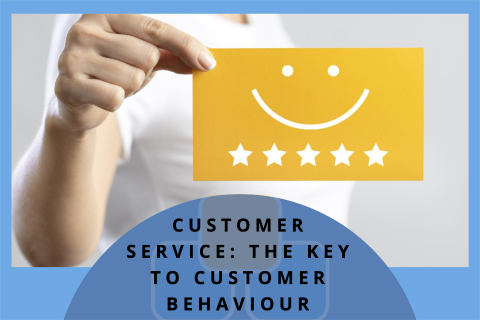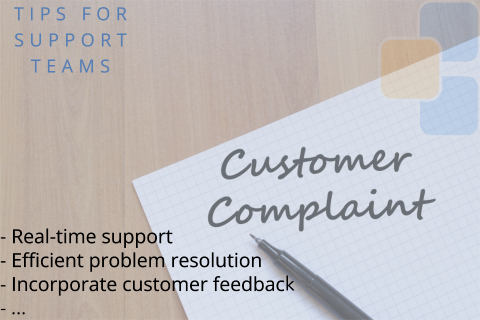Any customer-facing company operates customer service or after-sales management in one way or another. This refers to looking after your customers by phone, letter, fax, e-mail, messenger (e.g. WhatsApp), chat and on site. Similarly, the commissioning (or implementation) with maintenance and servicing of the equipment, systems, machines and systems purchased from you, falls into the field of customer service and customer support.
For successful sales and long-term customer loyalty, good customer service, preferably service excellence, is essential. So that no inquiry disappears in Nirvana and no customer is inadvertently overlooked, in addition to trained, motivated employees, you need reliable, intelligent and well-structured software at your side.

"Customer service is not a department, but an attitude that permeates the entire company." - Shep Hyken
What is the difference between customer service, customer support and after-sales service?

Customer service, customer support and after-sales service are three terms that are often used interchangeably, yet represent different aspects of efficient customer management. In this article, we will explain the differences and intersections between these terms and provide tips for improving customer service and customer support.
Definition of customer service
Customer service encompasses all activities that aim to satisfy the customer and ensure a positive customer experience. This includes direct contact with customers, both in person and through various communication channels such as telephone, email, Self-Service Portal or live chat.
Definition of customer support
Customer support focuses specifically on assisting customers with technical problems or questions about a particular product or service. This involves providing technical knowledge and expertise to effectively troubleshoot problems and ensure customer satisfaction.
Definition of after-sales service
After-sales service refers to all activities that take place after the sale of a product or service delivery. This includes commissioning, implementation, training, maintenance and servicing of products or services to ensure that customers receive the best possible support.
How can you improve customer service?

Effective communication
Effective communication is the key to good customer service. Staff should be clear and understandable and always take care to understand and address customers' needs and concerns. The use of live chat and other communication tools can facilitate interaction with customers and lead to quick resolutions.
Staff training
Thorough training of customer service staff is essential to ensure they have the expertise to answer customer questions and resolve issues. Training should be conducted regularly to keep employees up to date and continuously improve their skills.
Automating processes
Automating customer service processes can help increase efficiency and reduce response time to customer queries. By providing self-service options, such as FAQs or automated responses to frequently asked questions, customers can get answers to their questions quickly and easily.
What are the most important key figures for customer service?
Customer satisfaction
Customer satisfaction is one of the most important metrics for customer service. It measures how satisfied customers are with a product or service delivery and whether their needs and concerns are met.
Customer experience
The customer experience encompasses all interactions and touchpoints a customer has with a company. A positive customer experience contributes to customer loyalty and can lead to further repeat purchases and positive referrals.
Response time
Response time measures how quickly a company responds to customer queries. A quick response time is important to meet customer needs and ensure their satisfaction.
What soft skills are important for customer service?
Empathy
Empathy is crucial for customer service. Employees should be able to put themselves in the shoes of customers and understand their needs and concerns. Empathy can build customer relationships and create long-term customer loyalty.
Patience
Patience is another important soft skill for customer service. Customers may be frustrated or angry, and it is important to remain patient and help them solve their problems without upsetting them.
Communication skills
Good communication skills are essential to effectively communicate customer concerns and provide clear information. Staff should be able to express themselves clearly and explain solutions to problems in an understandable way.
How does customer service influence customer behaviour?

Customer loyalty
Excellent customer service can contribute to customer loyalty. When customers are satisfied, they are more likely to return and recommend their positive experience to others.
Referrals
The positive customer experience created by good customer service can lead to positive referrals. Satisfied customers are more likely to recommend a product or service to others.
Repeat purchases
Customers who have benefited from excellent customer service are more likely to purchase from a company again. Good customer service strengthens customer relationships and encourages repeat purchases.
How can support teams improve customer support?

Real-time support
Real-time support is an important aspect of customer support. The ability to support customers in real time, for example through live chat or telephone, enables support teams to respond quickly to questions or problems and ensure efficient problem resolution.
Efficient problem resolution
Efficient problem resolution is critical to good customer support. Support teams should have the expertise to resolve customer issues quickly and effectively and ensure that customers are satisfied with the solutions provided.
Incorporate customer feedback
Customer feedback is a valuable resource for continuously improving customer support. Support teams should ask customers for feedback and use this feedback to optimise their service and better understand customers' needs.
Improve customer service, customer support and the after-sales service with EcholoN
Thanks to systemic support from EcholoN, the quality of service delivered is reproducible. This is how you professionally address customer inquiries, because your service processes are standardized. EcholoN can help you with installations, customer consulting or customer service.

EcholoN customer service is based on the EcholoN Ticket System with Knowledge Base and Configuration Management Data Base (CMDB), with which the devices, systems and facilities with part master and spare parts can be managed. From the simple assembly to the complex parts list, all components and their dependencies can be mapped. With this module alone, which you will also find in the EcholoN Express-Edition, you can already record, answer, forward, edit, track and document inquiries from your detectors. Likewise, a service portal with selfhelp can be set up for your customers. For example, problems can already be solved through the FAQs of your service portal, without the customer having to make direct contact with your employees.
Reliable billing of services rendered
The basis for an optimal service offer is the precise planning and handling of all service assignments. EcholoN provides the order management with all required information centrally. Thus, open service orders and service assignments or commissioned time and material consumed are always documented. In this way, you support your service employees in a practical and reliable manner in the processing and coordination of your orders.
On the way to service excellence, the Ticket System alone will probably not be enough for you. In addition, we offer you three further solutions:
The EcholoN Field Service Management focusses on your dispatch department, as well as your service technicians and field staff.
From deployment planning for commissioning, upkeep, repairs and maintenance, from order management to real-time mobile access.
The EcholoN Service Desk focusses on your service centre. In general, the service desk is characterized by its "Single Point Of Contact" (SPOC), which offers the user the advantage of a central contact person.
The Service Desk as a central functional unit for controlling the service processes in medium and large organizational units.
The EcholoN Helpdesk differs only slightly from the EcholoN Service Desk. The Helpdesk with its three service levels is mainly used for small and medium-sized teams and simple work structures.
These solutions can be combined, configured and adapted as desired. It is also possible to select or deselect modules afterwards.
We see ourselves not only as a "software supplier" but as a long-term advisor and companion, helping you achieve your business goals. On request we can help you to certify your service excellence according to DIN SPEC 77224.
This might also interest you: What is Customer Service Management (CSM)?
Reasons for the EcholoN Customer Service
Proactive planning of service times with your customers
Scheduled maintenance, upkeep and repair work through regular resubmission. The system reminds you as well as your customers automatically and thus increases customer satisfaction.
EcholoN on the go
With the Mobile Client you have an automated flow of information between inside and outside sales. This completely eliminates the need for subsequent manual, time-consuming data entry of paper-based service reports.
Edit service orders
Precise planning and handling of all service assignments, as EcholoN provides the order management with all required information centrally. Thus, open service orders and service assignments or commissioned time and material consumed are always documented.
Reliable billing of services rendered
The internal and external service accounting can be done by EcholoN directly or by a data transfer to your settlement system.
The billing of performed services and activities takes place in accordance with the order (order to cash). A history documents the change process in service provision per customer.
Services can be billed per period or in individual services, based on service contracts and transactions.